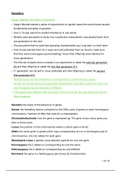Summary
Summary Genetics and Genetic Engineering: Matric Life Sciences
- Course
- Life Sciences Matric: IEB
- Institution
- Kingsmead College
A concise, bullet-pointed summary on Genetics. Covers strictly what you need to know for all tests and assessments (as dictated by the SAGS guidelines). Includes annotated diagrams and images to illustrate points mentioned, as well as additional research, helpful when understanding the work
[Show more]



